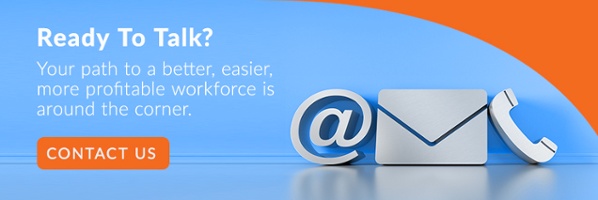HR administration is a thorn in the side of small-to-medium-sized business owners. Not only do business owners spend an average of one-fifth of their time dealing with HR issues, but the cost, scope, and nuance of HR can quickly become overwhelming. So, is it any wonder that 76% of business owners outsource their HR administration?
Each outsourced HR solution has unique advantages and disadvantages; this includes Professional Employer Organizations (PEOs), which are incredibly popular with SMBs. Around 180,000 businesses currently utilize their HR expertise. So, should you leverage the expertise of a PEO to handle your HR needs?
It's a great question!
There are many misconceptions about PEOs and how they function with your overall business strategy. Today, let's cover some of the pros and cons of using a PEO as your HR partner. Let's cut the red tape, dig into the details, and get a realistic sense of whether PEOs are the right fit for your unique business situation.
The Pros of Working with a PEO
PEOs relieve the burden of your HR administrative duties. So, there are plenty of individual pros that we could discuss. In general, these pros can be separated into five core buckets:
- Affordability of benefits
- Cost savings
- ROI
- Compliance & error mitigation
- HR administration burdens and time costs
1. Affordability of Benefits
Economies of scale are an incredibly powerful tool that's generally unavailable to small businesses. When you don't have a pool of employees to offset risks, benefits providers charge you more than your larger competitors.
PEOs bring small businesses economies of scale. When you enter a partnership with a PEO, you gain access to their benefits plans negotiated on behalf of thousands of employees by experts. This allows your company to secure better benefits at a lower cost than would otherwise be possible.
2. Cost Savings
PEOs save costs across a variety of ways, including:
- Not needing to hire more HR representatives
- Preventing Regulatory Fines
- Lowered E-mods for Workers' compensation
- SUTA rate management
They also save you money compared to other outsourcing solutions.
Local PEOs charge comparable rates to payroll processors — who only provide a single HR function.
3. ROI
The average ROI of using a PEO stands around 27%. Compared to other outsourcing methods, PEOs provide an incredibly high overall ROI. It's important to note that the ROI does vary by PEO. Again, national PEOs generally come with a lower ROI. They cost more, have plenty of hidden charges, and pass those hefty marketing and office bills on to your business.
4. Compliance & Risk Mitigation
Compliance is a significant cost center for most businesses, small or large. 57% of senior executives say that compliance and risk mitigation are their top priorities. And 40% of small businesses incur IRS penalties.
That's where PEOs can help. Not only do PEOs help you with posting requirements, notices, and basic compliance, but they handle compliance with:
- The Family and Medical Leave Act (FMLA)
- The Fair Labor Standards Act (FLSA)
- The Occupational Safety and Health Administration (OSHA)
- The Americans with Disabilities Act (ADA)
- EEO-1
5. HR Administration Burdens and Time Costs
HR administration is a serious time burden. The average business owner spends 25% of their time on employee paperwork, one day a week on HR administration, and five to eight hours each period dealing with payroll.
And that's the tip of the iceberg.
There's compliance, workers' comp, benefits, and various other pain points business owners have to worry about regularly. 30% of business owners admit to feeling nervous about how they handle their HR issues.
HR administration is one of the most paperwork-heavy, risk-heavy, and time-heavy components of running a modern business. There's a reason that businesses with a PEO partner are 50% less likely to go out-of-business. HR administration is a time-sap that restricts growth, creates risk, and contributes to 56% of small business owners feeling "significantly stressed."
The Cons of Working With a PEO
There are some situation-specific cons to working with PEOs. You may already have a robust payroll architecture that digs into the ROI of hiring an outsourced HR partner. Or, you may want only to outsource a very specific issue. But, generally, we find these three cons to be the "dealbreakers" for many organizations that use non-PEO HR outsourcing solutions.
- Large Company ROI
- Sufficient In-House HR
- New Technology Frictions
1. Large Company ROI
Large companies won't see the same ROI as small-to-medium-sized businesses: Most large businesses already have a robust HR team. If you have over 350 employees, you also won't save as much on benefits, since you generate internal economies of scale. We find that larger companies get lower a lower overall ROI from PEOs, but it's almost always still positive.
2. Sufficient In-House HR
Some companies, especially larger ones, already have an internal HR team. In this case, the benefits of a PEO start to slim down. You may already have a team handling payroll and a team handling workers' compensation. Typically, PEOs work best for businesses that can't afford a massive HR team, those that want a slimmed-down version of an HR team, or those looking for assistance in particular HR areas.
3. New Technology Frictions
PEOs bring their own tech stack. This often includes best-in-class payroll systems, HR systems, workers' comp software, self-service systems, etc. Like any new technology, there can be pain points surrounding implementation. You may be used to specific workflows, have fears about employee training, or have nightmares about new implementations due to past experiences. However, the overall payoff for upgrading systems is massive.
With a great PEO, you don't have to worry about training and implementation; your PEO should handle both of those needs for you.
Is A PEO Right for You?
For small-to-medium-sized businesses with fewer than 350 employees, the pros of partnering with a PEO far outweigh the cons. You get best-in-class payroll, compliance, benefits, workers' compensation, and more under the umbrella of one solution. With an average ROI of 27% and 7 to 9 percent faster growth, PEOs continue to provide world-class ROIs for businesses looking to reduce their HR headaches.
For larger businesses with over 350 employees, you won't get the same ROI as smaller businesses. You already have economies-of-scale, an internal HR team, and (ideally) an amazing compliance team. However, the benefits of having a PEO for payroll and workers' compensation can still generate a positive ROI.



